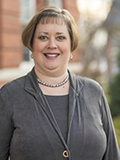Charting Your Path: Essential Strategies for New Faculty
May 20, 2025
1:00 PM - 2:00 PM (ET)
Presented by the Graduate Nursing Student Academy
Webinar Details
Are you nearing the end of your doctoral journey and considering a future in academia as faculty? If so, don’t miss this webinar! Join Dr. Nnaka as he explores post-doctoral training options, mentorship for new faculty, and strategies for building your leadership trajectory. The speaker will also shed light on navigating the often-unspoken rules of academia, particularly around publishing, so you feel confident as you embark on your faculty career.
Outcomes:
- Gain an understanding of the key considerations for new post-doctoral faculty.
- Explore opportunities for building a leadership trajectory as new faculty.
- Discuss different types of mentorship including responsive and bi-directional mentorship.
Note: Recording of the webinar will be available soon after the webinar airs. Visit AACN's On-Demand Webinars to watch.
Speakers
Speaker
 Tonychris Nnaka, PhD, MPH, RN, CPH
Tonychris Nnaka, PhD, MPH, RN, CPH
Associate Dean for Research and Associate Professor of Nursing
University of North Texas Health Science Center
Dr. Tonychris Nnaka is an Associate Professor of Nursing and serves as the founding Associate Dean for Research at the University of North Texas Health Science Center (UNTHSC), College of Nursing (CON) in Fort Worth, Texas. A nurse scientist and epidemiologist, his research focuses on improving health outcomes among ethnic populations living with heart diseases through digital therapeutics. Dr. Nnaka is a dual T-32 trained researcher at the University of Texas at Austin and the Geisel School of Medicine at Dartmouth College.
Dr. Nnaka’s reach expands beyond academics and research; he has extensive experience in policy, in various capacities in public health and policy, through his prior work as a fellow at the United States Department of Health and Human Services Region 6 Immediate Office of the Regional Director and most recently serving as the Health Policy Advisor to the City of Dallas Mayor. Dr. Nnaka is committed to bringing transformational changes in the academic preparation of nurses across all ranks and bridging the gaps between nursing science, practice, and policy.
Dr. Nnaka was an environmental health Jonas Scholar. He earned a bachelor’s degree in nursing science from the University of Texas at Arlington, a dual Master of Public Health degree in Epidemiology and Environmental & Occupational Health Sciences from the University of North Texas Health Science Center in Fort Worth, and a Ph.D. in nursing science from the University of Texas at Austin School of Nursing.
Tags
Redesigning the Broken U.S. Health System: The Nursing Profession’s Role in Ending Unequal Treatment
May 14, 2025
3:00 PM - 4:00 PM (ET)
Webinar Details
In June 2024, the National Academies of Sciences, Engineering, and Medicine (NASEM) released Ending Unequal Treatment: Strategies to Achieve Equitable Health Care and Optimal Health for All—a follow-up to the original Unequal Treatment report from 2003. Ending Unequal Treatment offers a comprehensive, deeply researched, evidence-based review of health and health inequities within the US healthcare system. The report explores the barriers that continue to undermine efforts to achieve more equitable healthcare, including behavioral health, and presents recommendations for future actions that would achieve a more effective and sustained approach to addressing the problem, with implications for the nursing profession. This presentation will provide an overview of the Ending Unequal Treatment report and highlight what the findings mean for nurses and other health professionals, including their role in eliminating health and healthcare inequities.
Objectives:
- Review and summarize the current state of healthcare and health inequities in the U.S., the evolving political moment, and the role of nurses and other healthcare professionals in responding to these uncertain times.
- Identify enduring, fundamental truths for the nursing profession that can guide efforts to eliminate health inequities.
- Integrate social and clinical care principles with key strategies to advance an interdisciplinary health workforce, policy advocacy, and systems change to end unequal treatment.
This Webinar is hosted by Jonas Nursing.

Speakers
Speaker
 Vincent Guilamo-Ramos, PhD, MSN, MPH, MS, MSW, BS, RN, ANP-BC, LCSW, PMHNP-BC, FAAN
Vincent Guilamo-Ramos, PhD, MSN, MPH, MS, MSW, BS, RN, ANP-BC, LCSW, PMHNP-BC, FAAN
Executive Director
Institute for Policy Solutions
Leona B. Carpenter Chair in Health Equity and Social Determinants of Health Professor
Johns Hopkins University School of Nursing
Dr. Vincent Guilamo-Ramos is the Executive Director of the Institute for Policy Solutions and the Leona B. Carpenter Chair in Health Equity and Social Determinants of Health (SDOH) at the Johns Hopkins School of Nursing. He is also the founding director of the Center for Latino Adolescent and Family Health (CLAFH). Dr. Guilamo-Ramos is a nurse practitioner, dually licensed in adult health and psychiatric-mental health nursing.
Widely regarded as a scholar and leader in SDOH and in developing, evaluating, and translating nurse-driven, community-based interventions, his research has been funded for two decades by NIH, CDC, and various federal agencies. His work has been published in leading scientific journals, including The New England Journal of Medicine, The Lancet, The British Medical Journal, Nature Medicine, Clinical Infectious Diseases, and the American Journal of Public Health.
Dr. Guilamo-Ramos has served as a member of the ad hoc NASEM Committee on Unequal Treatment Revisited: The Current State of Racial and Ethnic Disparities in Healthcare; the NASEM Standing Committee on Reproductive Health, Equity, and Society; and the board of UnidosUS, the nation’s largest Latino-focused civil rights organization. He also serves on the Latino Commission on AIDS Board of Directors as vice chair and as the chair of the board of directors for Power to Decide.
Tags
Redesigning the Broken U.S. Health System: The Nursing Profession’s Role in Ending Unequal Treatment
May 14, 2025
3:00 PM - 4:00 PM (ET)
Webinar Details
In June 2024, the National Academies of Sciences, Engineering, and Medicine (NASEM) released Ending Unequal Treatment: Strategies to Achieve Equitable Health Care and Optimal Health for All—a follow-up to the original Unequal Treatment report from 2003. Ending Unequal Treatment offers a comprehensive, deeply researched, evidence-based review of health and health inequities within the US healthcare system. The report explores the barriers that continue to undermine efforts to achieve more equitable healthcare, including behavioral health, and presents recommendations for future actions that would achieve a more effective and sustained approach to addressing the problem, with implications for the nursing profession. This presentation will provide an overview of the Ending Unequal Treatment report and highlight what the findings mean for nurses and other health professionals, including their role in eliminating health and healthcare inequities.
Objectives:
- Review and summarize the current state of healthcare and health inequities in the U.S., the evolving political moment, and the role of nurses and other healthcare professionals in responding to these uncertain times.
- Identify enduring, fundamental truths for the nursing profession that can guide efforts to eliminate health inequities.
- Integrate social and clinical care principles with key strategies to advance an interdisciplinary health workforce, policy advocacy, and systems change to end unequal treatment.
This Webinar is hosted by Jonas Nursing.

Speakers
Speaker
 Vincent Guilamo-Ramos, PhD, MSN, MPH, MS, MSW, BS, RN, ANP-BC, LCSW, PMHNP-BC, FAAN
Vincent Guilamo-Ramos, PhD, MSN, MPH, MS, MSW, BS, RN, ANP-BC, LCSW, PMHNP-BC, FAAN
Executive Director
Institute for Policy Solutions
Leona B. Carpenter Chair in Health Equity and Social Determinants of Health Professor
Johns Hopkins University School of Nursing
Dr. Vincent Guilamo-Ramos is the Executive Director of the Institute for Policy Solutions and the Leona B. Carpenter Chair in Health Equity and Social Determinants of Health (SDOH) at the Johns Hopkins School of Nursing. He is also the founding director of the Center for Latino Adolescent and Family Health (CLAFH). Dr. Guilamo-Ramos is a nurse practitioner, dually licensed in adult health and psychiatric-mental health nursing.
Widely regarded as a scholar and leader in SDOH and in developing, evaluating, and translating nurse-driven, community-based interventions, his research has been funded for two decades by NIH, CDC, and various federal agencies. His work has been published in leading scientific journals, including The New England Journal of Medicine, The Lancet, The British Medical Journal, Nature Medicine, Clinical Infectious Diseases, and the American Journal of Public Health.
Dr. Guilamo-Ramos has served as a member of the ad hoc NASEM Committee on Unequal Treatment Revisited: The Current State of Racial and Ethnic Disparities in Healthcare; the NASEM Standing Committee on Reproductive Health, Equity, and Society; and the board of UnidosUS, the nation’s largest Latino-focused civil rights organization. He also serves on the Latino Commission on AIDS Board of Directors as vice chair and as the chair of the board of directors for Power to Decide.
Tags
Redesigning the Broken U.S. Health System: The Nursing Profession’s Role in Ending Unequal Treatment
May 14, 2025
3:00 PM - 4:00 PM (ET)
Webinar Details
In June 2024, the National Academies of Sciences, Engineering, and Medicine (NASEM) released Ending Unequal Treatment: Strategies to Achieve Equitable Health Care and Optimal Health for All—a follow-up to the original Unequal Treatment report from 2003. Ending Unequal Treatment offers a comprehensive, deeply researched, evidence-based review of health and health inequities within the US healthcare system. The report explores the barriers that continue to undermine efforts to achieve more equitable healthcare, including behavioral health, and presents recommendations for future actions that would achieve a more effective and sustained approach to addressing the problem, with implications for the nursing profession. This presentation will provide an overview of the Ending Unequal Treatment report and highlight what the findings mean for nurses and other health professionals, including their role in eliminating health and healthcare inequities.
Objectives:
- Review and summarize the current state of healthcare and health inequities in the U.S., the evolving political moment, and the role of nurses and other healthcare professionals in responding to these uncertain times.
- Identify enduring, fundamental truths for the nursing profession that can guide efforts to eliminate health inequities.
- Integrate social and clinical care principles with key strategies to advance an interdisciplinary health workforce, policy advocacy, and systems change to end unequal treatment.
This Webinar is hosted by Jonas Nursing.

Speakers
Speaker
 Vincent Guilamo-Ramos, PhD, MSN, MPH, MS, MSW, BS, RN, ANP-BC, LCSW, PMHNP-BC, FAAN
Vincent Guilamo-Ramos, PhD, MSN, MPH, MS, MSW, BS, RN, ANP-BC, LCSW, PMHNP-BC, FAAN
Executive Director
Institute for Policy Solutions
Leona B. Carpenter Chair in Health Equity and Social Determinants of Health Professor
Johns Hopkins University School of Nursing
Dr. Vincent Guilamo-Ramos is the Executive Director of the Institute for Policy Solutions and the Leona B. Carpenter Chair in Health Equity and Social Determinants of Health (SDOH) at the Johns Hopkins School of Nursing. He is also the founding director of the Center for Latino Adolescent and Family Health (CLAFH). Dr. Guilamo-Ramos is a nurse practitioner, dually licensed in adult health and psychiatric-mental health nursing.
Widely regarded as a scholar and leader in SDOH and in developing, evaluating, and translating nurse-driven, community-based interventions, his research has been funded for two decades by NIH, CDC, and various federal agencies. His work has been published in leading scientific journals, including The New England Journal of Medicine, The Lancet, The British Medical Journal, Nature Medicine, Clinical Infectious Diseases, and the American Journal of Public Health.
Dr. Guilamo-Ramos has served as a member of the ad hoc NASEM Committee on Unequal Treatment Revisited: The Current State of Racial and Ethnic Disparities in Healthcare; the NASEM Standing Committee on Reproductive Health, Equity, and Society; and the board of UnidosUS, the nation’s largest Latino-focused civil rights organization. He also serves on the Latino Commission on AIDS Board of Directors as vice chair and as the chair of the board of directors for Power to Decide.
Tags
Integrating the Essentials and Quality into Nursing Using the Million Hearts Initiative: Part 2
May 08, 2025
1:00 PM - 2:00 PM (ET)
Webinar Details
This webinar will introduce nursing educators to the Centers for Disease Control and Prevention’s hypertension, cholesterol, hypertension in pregnancy, tobacco cessation, and cardiac rehab control packages as competency-based tools for teaching evidence-based practice, quality improvement, and population health. Exemplars will be provided for integrating these control packages into nursing curricula and as DNP projects.
Outcomes:
- Explore the Million Hearts Control Change Packages
- Recognize best practices for implementation of the Million Hearts Change packages into nursing curricula
- Examine the Million Hearts Change packages as DNP project resources
Note: Recording of the webinar will be available soon after the webinar airs. Visit AACN's On-Demand Webinars to watch.
Speakers
Speakers

Kate Gawlik DNP, APRN-CNP, FAAN, FNAP, FAANP
Associate Professor of Clinical Nursing
The Ohio State University
Dr. Kate Gawlik is an Associate Professor of Clinical Nursing, Director of Undergraduate Health and Wellness Academic Programming, and the Director of the Bachelor of Science in health and wellness program at The Ohio State University. She is a Family Nurse Practitioner and her areas of expertise are in wellness, cardiovascular prevention, parental burnout, and nursing education. She pioneered an online educational program, the Million Hearts Fellowship, for healthcare professionals that has resulted in the cardiovascular screening and education of over 110,000 people nationwide and has been embedded into nursing curricula across the U.S. This work has received four national awards, including most recently, the AACN’s Innovation in Professional Nursing Education Award. She is a Fellow of the American Association of Nurse Practitioners, the National Academies of Practice, and the American Academy of Nursing.

Jennifer Cooper, DNP, RN, PHNA-BC, CNE
Associate Professor & Chair
Hood College Department of Nursing
Dr. Jennifer Cooper is an Associate Professor and Department Chair for Nursing at Hood College in Frederick, Maryland. Her experience in community/public health nursing practice and nursing education provides the foundation for her practice, teaching, scholarship and service. She is a Past President of the Association of Public Health Nurses and liaison to the national Million Hearts® initiative. Dr. Cooper leads Hood Million Hearts®, where she works with nursing students to promote cardiovascular disease prevention in the Frederick community. She serves as a liaison for nursing to the Frederi
ck County Board of Health as a Board Member of the Maryland Nurses Association. Dr. Cooper earned her DNP from The George Washington University, MSN from Rush University and BSN from Cedarville University.